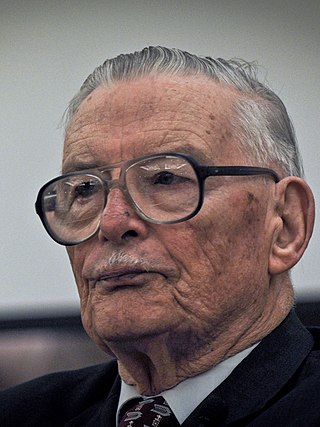
Friedrich August von Hayek, often referred to by his initials F. A. Hayek, was an Austrian-born British academic who contributed to political economy, political philosophy and intellectual history. Hayek shared the 1974 Nobel Memorial Prize in Economic Sciences with Gunnar Myrdal for work on money and economic fluctuations, and the interdependence of economic, social and institutional phenomena. His account of how prices communicate information is widely regarded as an important contribution to economics that led to him receiving the prize. He was a major contributor to the Austrian school of economics.

Public choice, or public choice theory, is "the use of economic tools to deal with traditional problems of political science." It includes the study of political behavior. In political science, it is the subset of positive political theory that studies self-interested agents and their interactions, which can be represented in a number of ways—using standard constrained utility maximization, game theory, or decision theory. It is the origin and intellectual foundation of contemporary work in political economics.

James McGill Buchanan Jr. was an American economist known for his work on public choice theory originally outlined in his most famous work, The Calculus of Consent, co-authored with Gordon Tullock in 1962. He continued to develop the theory, eventually receiving the Nobel Memorial Prize in Economic Sciences in 1986. Buchanan's work initiated research on how politicians' and bureaucrats' self-interest, utility maximization, and other non-wealth-maximizing considerations affect their decision-making. He was a member of the Board of Advisors of The Independent Institute as well as of the Institute of Economic Affairs, a member of the Mont Pelerin Society (MPS) and MPS president from 1984 to 1986, a Distinguished Senior Fellow of the Cato Institute, and professor at George Mason University.

Law and economics, or economic analysis of law, is the application of microeconomic theory to the analysis of law. The field emerged in the United States during the early 1960s, primarily from the work of scholars from the Chicago school of economics such as Aaron Director, George Stigler, and Ronald Coase. The field uses economics concepts to explain the effects of laws, assess which legal rules are economically efficient, and predict which legal rules will be promulgated. There are two major branches of law and economics; one based on the application of the methods and theories of neoclassical economics to the positive and normative analysis of the law, and a second branch which focuses on an institutional analysis of law and legal institutions, with a broader focus on economic, political, and social outcomes, and overlapping with analyses of the institutions of politics and governance.
The Chicago school of economics is a neoclassical school of economic thought associated with the work of the faculty at the University of Chicago, some of whom have constructed and popularized its principles. Milton Friedman and George Stigler are considered the leading scholars of the Chicago school.
Catallactics is a theory of the way the free market system reaches exchange ratios and prices. It aims to analyse all actions based on monetary calculation and trace the formation of prices back to the point where an agent makes his or her choices. It explains prices as they are, rather than as they "should" be. The laws of catallactics are not value judgments, but aim to be exact, empirical, and of universal validity. It was used extensively by the Austrian School economist Ludwig von Mises.
The Calculus of Consent: Logical Foundations of Constitutional Democracy is a book published by economists James M. Buchanan and Gordon Tullock in 1962. It is considered to be one of the classic works from the discipline of public choice in economics and political science. This work presents the basic principles of public choice theory.
Spontaneous order, also named self-organization in the hard sciences, is the spontaneous emergence of order out of seeming chaos. The term "self-organization" is more often used for physical changes and biological processes, while "spontaneous order" is typically used to describe the emergence of various kinds of social orders in human social networks from the behavior of a combination of self-interested individuals who are not intentionally trying to create order through planning. Proposed examples of systems which evolved through spontaneous order or self-organization include the evolution of life on Earth, language, crystal structure, the Internet, Wikipedia, and free market economy.
Law reform or legal reform is the process of examining existing laws, and advocating and implementing change in a legal system, usually with the aim of enhancing justice or efficiency.

Rechtsstaat is a doctrine in continental European legal thinking, originating in German jurisprudence. It can be translated into English as "rule of law", alternatively "legal state", state of law, "state of justice", or "state based on justice and integrity". It means that everyone is subjected to the law, especially governments.
Constitutional theory is an area of constitutional law that focuses on the underpinnings of constitutional government. It overlaps with legal theory, constitutionalism, philosophy of law and democratic theory. It is not limited by country or jurisdiction.
Budget theory is the academic study of political and social motivations behind government and civil society budgeting. Classic theorists in Public Budgeting include Henry Adams, William F. Willoughby, V. O. Key, Jr., and, more recently, Aaron Wildavsky. Notable recent theorists include Frank R. Baumgartner, Bryan D. Jones, Richard Fenno, Allen Schick, Dennis Ippolito, Naomi Caiden, Irene Rubin, James D. Savage, Thomas Greitens, Gary Wamsley, and Usman W. Chohan. Budget theory was a central topic during the Progressive Era and was much discussed in municipal bureaus and other academic and quasi-academic facilities of that time such as the nascent Brookings Institution.

Economic methodology is the study of methods, especially the scientific method, in relation to economics, including principles underlying economic reasoning. In contemporary English, 'methodology' may reference theoretical or systematic aspects of a method. Philosophy and economics also takes up methodology at the intersection of the two subjects.
The Virginia School of political economy is a school of economic thought originating at the Thomas Jefferson Center for Studies in Political Economy of the University of Virginia in the 1950s and 1960s. Some of its proponents established the Center for Study of Public Choice at Virginia Tech in 1969, moving it to George Mason University in 1983. The school focuses primarily on public choice theory, constitutional economics, and law and economics.

The Constitution of Liberty is a book written by Friedrich Hayek, first published in 1960 by the University of Chicago Press. Many scholars have considered The Constitution of Liberty as the most important work by Hayek.

Robert D. Tollison was an American economist who specialized in public choice theory.

Public economics(or economics of the public sector) is the study of government policy through the lens of economic efficiency and equity. Public economics builds on the theory of welfare economics and is ultimately used as a tool to improve social welfare. Welfare can be defined in terms of well-being, prosperity, and overall state of being.

David L. Prychitko is an American economist of the Austrian school. Prychitko is a critic of Marxism, but defends the idea of workers' self-managed firms in a freed market system. Prychitko is a tenured professor at Northern Michigan University.

Liberty Fund, Inc. is a nonprofit foundation headquartered in Carmel, Indiana, which promotes the libertarian views of its founder, Pierre F. Goodrich through publishing, conferences, and educational resources. The operating mandate of the Liberty Fund was set forth in an unpublished memo written by Goodrich "to encourage the study of the ideal of a society of free and responsible individuals".
The rule according to a higher law is a statement which expresses that no law may be enforced by the government unless it conforms with certain universal principles of fairness, morality, and justice. Thus, the rule according to a higher law may serve as a practical legal criterion to qualify the instances of political or economical decision-making, when a government, even though acting in conformity with clearly defined and properly enacted law, still produces results which many observers find unfair or unjust.









